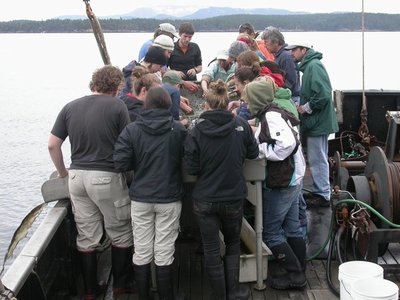April 8, 2010
UW undergrads now routinely do research, study shows
A new study shows that UW undergraduates are doing a great deal of research as a normal part of their undergraduate programs — more than investigators anticipated. Students in the study reported that almost half of the courses they took after their freshman year had required research, most of it concentrated in upper-level courses.
“I don’t know if undergraduates are doing more research than in the past, but they’re doing a lot. We were amazed at how much,” said Catharine Beyer, who with fellow research scientist Jon Peterson conducted the study for the UW Office of Educational Assessment.
In a series of focus groups, they and two other researchers spoke with 138 seniors across 15 academic departments.
Research skills are important, according to “The UW Senior Research Study 2009,” because employers often cite the ability to find and use information as the most important skill a college education can provide. UW graduates who responded to a 2007 alumni survey one year after graduation said the ability to locate information was the skill “most important to their primary activity.”
Beyer and her colleagues found that while students may have developed some research skills in high school, they usually don’t arrive at the UW with sufficient research abilities. “That means what they learn to do, they mostly learn here,” Beyer said.
Students reported conducting research in an average of 13 UW courses, about half in their majors, according to the study. However, research methods varied considerably from one discipline to another, so skills learned in a history class weren’t necessarily useful in biology.
Yet Beyer and her colleagues found similarities in purposes and methods.
For example, art majors and engineering majors said they constantly studied designs and gathered information about materials and experimented with forms and structures, both as part of assignments and on their own.
According to the study, most students learned research skills “in specific courses where such tools and skills were intentionally taught or by trial and error.”
Students in a few majors, such as international studies, said research skills were intentionally scaffolded into the curricula. In most majors, however, research instruction depended on instructor goals for the class.
Speaking of research skills learned in class, one student said, “We read through research papers together and discussed what things meant — how this part of the paper was used to set up this other part . . . It can be difficult to get information out of research papers if you haven’t been shown how to use them.” (Beyer and her colleagues promised the students anonymity, so the report does not include names.)
Some students said they had to acquire certain skills before doing research: a new language, for example.
Sometimes, too, students found themselves digging far beyond textbooks. In the sciences, for example, a textbook can be out of date by the time it’s printed, so students sometimes had to find out who’s doing key work and follow those people via research papers and online groups.
“I’d say that most important is to be able to let yourself ask others questions,” said one student. “If you don’t know, you need to ask.”
Not surprisingly, students also said librarians had been very useful, and students in all majors reported using library databases.
Student recommendations for improving the undergraduate research experience were similar: require more research earlier, teach research skills and writing in the major, provide more information about departmental resources and connect students to the world of work related to their major.
And regardless of major, students listed similar recommendations for their peers: take time to understand the assignment; tap all resources possible, including faculty members; and learn to use the library.
“You kind of have to be like the clay: pliable, open, willing to change, teachable,” said a student.
To read “the UW Senior Research Study 2009,” go here.

